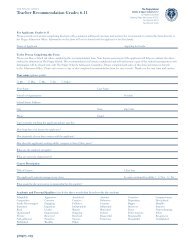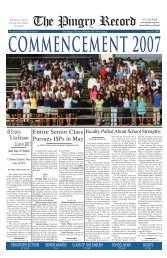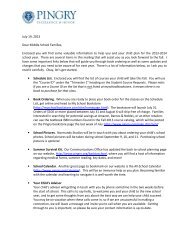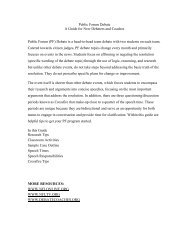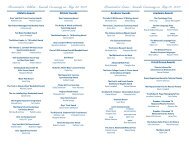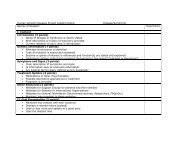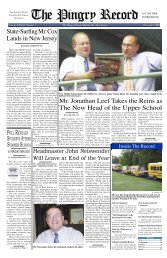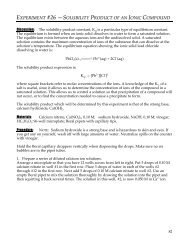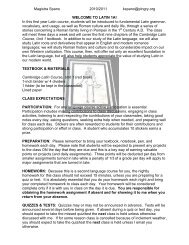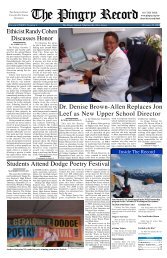March 10, 2006 - Pingry School
March 10, 2006 - Pingry School
March 10, 2006 - Pingry School
Create successful ePaper yourself
Turn your PDF publications into a flip-book with our unique Google optimized e-Paper software.
2<br />
Staff Writer<br />
Hallie Bianco<br />
Copy Editors<br />
Adam Goldstein<br />
Olivia Delia<br />
Sam Adriance<br />
Layout Staff<br />
Jack Dimassimo<br />
EDITORIAL<br />
Reason #735 to attend <strong>Pingry</strong>: Just in case we ever forget where<br />
we land on the sliding scale of good vs. evil, there will always<br />
be something around to remind us. From professional moralizers<br />
(installments of Randy Cohenʼs The Ethicist displayed in the Upper<br />
<strong>School</strong> Office) to digressional proselytizers à la Pam Stenzel,<br />
our school and indeed the world are full of self-fashioned moral<br />
compasses, presumably to make sure that, during our tenure as<br />
teens and beyond, our own ethics donʼt head too far south.<br />
Recent events at our school have prompted us to ask many<br />
questions: How much moralizing is too much? Can a personʼs<br />
background taint their message? How important is it to get the<br />
facts straight when delivering a moral issue? And can we ever<br />
really appreciate the moral convictions of a person we donʼt like<br />
or agree with?<br />
In this issue, Record writers attempt to answer these questions<br />
and more (see Commentary, pg. 5) And yet, as the Record goes<br />
to press, I canʼt help feeling as though weʼve missed the larger<br />
question: Is all the moralizing really working?<br />
Certainly, intentions are in the right place; high-class pseudo<br />
criminals of the Jack Abramoff variety have shown that money<br />
and brains donʼt exempt anyone from ethical equivocation. One<br />
may wonder, what if notoriously crooked lobbyist Mr. Abramoff<br />
had been apprehended at an earlier stage in his criminal career by<br />
the Honor Board? Or, what if every resident of Botswana, where<br />
37.7 percent of the population has HIV/AIDS, were slightly more<br />
wary of unsafe sex? And, conversely, if <strong>Pingry</strong> were to leave us<br />
to our own moral devices, would we then be destined for a life of<br />
deception, corporate crime, and indiscriminate unprotected sex?<br />
Somehow, this sounds implausible.<br />
At <strong>Pingry</strong>, I believe, we have a tendency to parade ethics like<br />
we invented them. And while itʼs comforting to believe that an assembly<br />
or two in the Hauser Auditorium will recalibrate our moral<br />
compass during its teenage flux, in reality, what they really do is<br />
reinforce (or sometimes contradict) convictions that have been<br />
formed long ago by sources outside the checkerboard halls.<br />
The proverbial compass is a product of the world, and it may<br />
not always point towards the clock tower. I am, and always have<br />
been, an avid Randy Cohen fan, but I know of few people who<br />
base their life decisions on his weekly column; likewise, browsing<br />
her website, itʼs clear that Pam Stenzelʼs high school performances<br />
speak most clearly to those students who have already chosen abstinence<br />
as a lifestyle. For better or worse, itʼs ultimately we who<br />
make our own decisions. <strong>Pingry</strong> can help, but only so much.<br />
For juniors who now enjoy<br />
the privilege of driving to school,<br />
it is sometimes difficult to understand<br />
why other privileges<br />
closely intertwined with driving,<br />
like off-campus and late<br />
arrival, are not extended to the<br />
junior class. Senior privilege is<br />
an integral part of high school<br />
life, however, and should be<br />
protected.<br />
To understand why senior<br />
privileges should remain specific<br />
to seniors, one must first understand<br />
that driving is, in itself,<br />
a privilege for juniors that we<br />
would not enjoy at many other<br />
schools. It is not at all uncommon<br />
for schools to allow only<br />
seniors to drive, and given current<br />
parking constraints, we are<br />
lucky to retain this privilege.<br />
Giving the right to park in the<br />
athletic entrance parking lot to<br />
seniors only, proposed by Student<br />
Government and approved<br />
by the administration, makes<br />
practical sense. Seniors leave<br />
campus far more frequently than<br />
juniors, who can only arrive in<br />
THE PINGRY RECORD COMMENTARY MARCH <strong>10</strong>, <strong>2006</strong><br />
- Chantal Berman<br />
Dan Davidson (VI)<br />
SCHOOL OPINION<br />
the morning and depart in the<br />
afternoon. Therefore the hassle<br />
of having to walk to the far parking<br />
lots is worse for seniors than<br />
for juniors.<br />
The senior privilege issue<br />
deals with much more than mere<br />
practicality. An increase in privilege<br />
as we move to higher grade<br />
levels is a sensible idea. The<br />
growing process is accentuated<br />
by an increase in both the allowance<br />
of new things and responsibility<br />
for these new privileges<br />
as time goes by. For example,<br />
as freshmen we lament having<br />
to bring water out to our games.<br />
We do it willingly, however, with<br />
the knowledge that our sacrifices<br />
in lower grades will increase our<br />
happiness when we reach an<br />
age we no longer have to make<br />
such sacrifices. Similarly, junior<br />
drivers such as myself should<br />
sacrifice prime parking spaces<br />
so that they may be assured them<br />
next year.<br />
Editors in Chief<br />
Nadine Reitman<br />
Chantal Berman<br />
Managing Editor<br />
Katie Jennings<br />
Assistant Editors<br />
Catherine Chong<br />
Melissa Loewinger<br />
Darina Shtrakhman<br />
Josh Freedman<br />
I am writing “The Ethicist”<br />
column, modeled after<br />
Randy Cohenʼs column of the<br />
same name in the “New York<br />
Times Magazine,” as a means<br />
to promote greater student<br />
understanding of the Honor<br />
Code by illustrating how ethical<br />
questions arise in the everyday<br />
lives of students. Dean of<br />
students Mrs. Joan Hearst has<br />
generously decided to support<br />
this effort through weekly postings<br />
of excerpts from Cohenʼs<br />
column on her door.<br />
My idea to start the column<br />
was sparked after leafing<br />
through “The Beginning of<br />
Wisdom,” a book writen by<br />
English teacher Herbert Hahn<br />
and published by the 1961<br />
board of trustees that chronicles<br />
the schoolʼs first <strong>10</strong>0 years and<br />
finding Appendix A: The Songs<br />
of <strong>Pingry</strong>. Part of the “Anniversary<br />
Hymn,” written by<br />
former Headmaster C. Bertram<br />
Newton, reads, “Praise God<br />
that when our school began/ Its<br />
builder was a man/ Who founded<br />
it on simple truth/ And deep<br />
respect for youth/ So, lacking<br />
other wealth of fame,/ It took<br />
his honored name,/ And, with it,<br />
faith in honest work/ That will<br />
not cheat or shirk.” I think this<br />
song truly embodies the ideals<br />
for which our school stands.<br />
In contemplating this song,<br />
and the others, I began to fear<br />
that we, to a certain extent, have<br />
lost sight of Dr. John <strong>Pingry</strong>ʼs<br />
original goals as represented<br />
in the Honor Code. The abuse<br />
With Seniority Comes Privilege<br />
VOLUME CXXXII<br />
NUMBER 3<br />
Sports Editor<br />
Hadley Johnson<br />
Photo Staff<br />
Marissa Bialecki<br />
Jennie Ellwanger<br />
Faculty Adviser<br />
Dr. Susan Dineen<br />
All rights reserved. All contents © <strong>2006</strong> The <strong>Pingry</strong> Record. Printed on recycled paper. Please recycle after use.<br />
The Ethicist Part One: An Introduction<br />
I am happy enough simply<br />
to be able to drive. Therefore I<br />
am more than willing to endure<br />
a short walk every morning and<br />
afternoon for the remainder<br />
of this year, knowing that I<br />
wonʼt have to make these walks<br />
next year. Let senior privileges<br />
remain for seniors, and allow<br />
the process of growth to flow<br />
naturally throughout our time in<br />
high school.<br />
Several years ago, the administration<br />
promised students<br />
that the school would never<br />
block any website again. The<br />
Honor Code, according to Upper<br />
<strong>School</strong> Head Adam Rohdie, was<br />
enough to keep students from<br />
visiting objectionable sites for<br />
illegitimate reasons. Even if a<br />
few individuals took advantage<br />
of the new system, he believed,<br />
the student body as a whole<br />
could be trusted to handle its<br />
of off-campus<br />
privileges, by<br />
seniors and juniors<br />
alike, demonstrates this<br />
tendency.<br />
A junior leaves campus during<br />
a free period in order to go<br />
to get something to eat. What<br />
is that person going to say if he<br />
gets caught? “Yes, Mrs. Hearst,<br />
I went off campus even though I<br />
know Iʼm not supposed to,” or,<br />
“No, Mrs. Hearst, I would never<br />
do that.” This is where the paradox<br />
lies: will that person have<br />
been influenced by the Honor<br />
Code and answer<br />
honestly?<br />
Neither answer<br />
is necessarily<br />
commendable.<br />
T h e r o o t<br />
of the Honor<br />
Code lies in<br />
taking responsibility.<br />
Iʼm<br />
sure the administration would<br />
be much happier if all of the<br />
juniors stayed on campus, but<br />
as long as the juniors know that<br />
if they go off campus “illegally”<br />
that they could potentially get<br />
caught, and as long as they donʼt<br />
lie if caught, in effect, the Honor<br />
Code has done its job. Even<br />
though they have committed<br />
a dishonorable act, they have<br />
not lied about it. The issue still<br />
remains that they knowingly<br />
new privileges<br />
responsibly.<br />
T i m e s<br />
change, though, and so do<br />
administrations. Recently the<br />
school imposed a filter of social<br />
networking websites like<br />
MySpace and Xanga, censoring<br />
websites for<br />
the first time<br />
in years.<br />
W h y t h e<br />
change? Several<br />
students<br />
were posting<br />
personal information on those<br />
sites while at school. In a climate<br />
of fear about online predators,<br />
the administration decided to<br />
quickly and quietly impose a<br />
blanket ban on such sites.<br />
It is easy to understand why<br />
they took such a step. After all,<br />
most uses of social networking<br />
sites are a violation of the Technology<br />
Agreement—a document<br />
every <strong>Pingry</strong> computer user has<br />
signed. Given the transgressions<br />
that have occurred in the past,<br />
the reasoning goes, thereʼs no<br />
better way to enforce compliance<br />
than to make it impossible for<br />
students to transgress at all.<br />
The Honor Code, however,<br />
says that “students should understand<br />
and live by standards<br />
of honorable behavior, which are<br />
essentially a matter of attitude<br />
Katie Jennings (VI)<br />
THE ETHICIST<br />
The root of the<br />
Honor Code lies<br />
in taking<br />
responsibility.<br />
committed an<br />
infraction.<br />
Now, Iʼm<br />
not saying that if you lied during<br />
your junior year of high<br />
school you should be branded<br />
a liar for the rest of your life;<br />
rather, I offer words of caution.<br />
It frightens me that after Honor<br />
Board assemblies, the majority<br />
of students laugh and continue<br />
their day. I urge you to actually<br />
take more than two seconds to<br />
think about the Honor Code and<br />
its effect on your actions.<br />
You might tell your English<br />
teacher that<br />
your computer<br />
broke and<br />
hence couldnʼt<br />
hand in your<br />
paper. Now<br />
did you really<br />
have technical<br />
problems or<br />
did you not do<br />
your paper? Why should your<br />
teacher believe you? Responsibility<br />
begets trust.<br />
There are three types of students<br />
in this school: people who<br />
follow the Honor Code, people<br />
who break the Honor Code and<br />
donʼt get caught, and people<br />
who break the Honor Code and<br />
do get caught. If you break the<br />
Honor Code and you donʼt get<br />
caught, does that make it right?<br />
If you were to break the Honor<br />
Rest in Peace<br />
and spirit rather<br />
than a system of<br />
rules and regulations.”<br />
The existence of a Web<br />
blockade implies that students<br />
cannot be trusted to do the right<br />
thing on the Internet—a radical<br />
policy shift that both contradicts<br />
the Honor Code<br />
Adam Goldstein (VI)<br />
SCHOOL OPINION<br />
and undermines<br />
studentsʼ trust<br />
in the administrationʼs<br />
past<br />
promises.<br />
Of course, if<br />
there were no legitimate academic<br />
uses for social networking<br />
sites, it would be hard to argue<br />
with blocking such sites. (The<br />
administration is well within its<br />
rights to regulate drugs, guns,and<br />
nuclear weapons on campus,<br />
for example, because the use of<br />
those items is always a hindrance<br />
to academic pursuits.)<br />
As it turns out, though, social<br />
networking sites do have legitimate<br />
uses. MySpace Music, for<br />
example, has royalty-free music<br />
tracks that can be downloaded<br />
freely and legally, which makes<br />
them perfect for use in film<br />
studentsʼ movie soundtracks.<br />
Health students can use Xanga<br />
to uncover teenagersʼ attitudes<br />
towards subjects like stress.<br />
U.S. History students can study<br />
popular reactions to events like<br />
Code just once, say by cheating<br />
on a vocabulary quiz, does that<br />
permanently put you in the category<br />
of Honor Code breaker, or<br />
can you redeem yourself?<br />
It is human nature to rationalize<br />
so that we can justify<br />
our actions. For example, one<br />
might rationalize, “I am just<br />
going to cheat on this one history<br />
test, so that I maintain my<br />
average, but then I will never do<br />
it again.” This rationalization<br />
might sound ok to you as you<br />
are undertaking this plan, but try<br />
telling that to your teacher. You<br />
might think, “Who cares? Itʼs<br />
just affecting me.” In essence,<br />
however, you are undermining<br />
the entire system.<br />
When you think about our<br />
school, think about the greater<br />
community. Think about how<br />
your actions might affect the<br />
others around you. The true<br />
essence of the Honor Code is<br />
taking responsibility for oneʼs<br />
actions.<br />
The point of my column is<br />
not to indoctrinate, but to facilitate<br />
continuous communication<br />
between the student body and<br />
the Honor Code, through the<br />
posing of ethical questions with<br />
which we, as a community, are<br />
faced.<br />
We welcome “The<br />
Ethicist” submissions at<br />
thepingryrecord@gmail.com<br />
<strong>March</strong> 20, 1989 - February 26, <strong>2006</strong><br />
John Taylor Babbitt<br />
Anyone who wishes to contribute photos or written memories for<br />
a memorial page in the final issue of the Record please contact<br />
thepingryrecord@gmail.com.<br />
A Web (Filter) of Lies and Distrust<br />
The web blockade<br />
implies that students<br />
cannot be trusted.<br />
presidential elections by reading<br />
what people had posted on their<br />
weblogs the day after. Now none<br />
of these resources are available<br />
at school.<br />
Certainly, if the Web filter<br />
were removed, some students<br />
would abuse the privilege of accessing<br />
social networking sites,<br />
just as some students cheat on<br />
papers despite signing the honor<br />
pledge. However, the spirit of<br />
the Honor Code—and indeed,<br />
the very idea of “innocent until<br />
proven guilty”—suggests that<br />
the presence of individual infringers<br />
is not reason in itself<br />
to block all studentsʼ access to<br />
certain sites.<br />
If the administration wants to<br />
block a site, therefore, it should<br />
satisfy a much more rigorous<br />
test than simply showing the site<br />
has illegitimate uses; instead, the<br />
administration should show that<br />
a website is not even capable of<br />
admissible uses. Until the administration<br />
can find a site that truly<br />
has no legitimate uses, it ought<br />
to follow the wise precedent set<br />
by Mr. Rohdie and remove the<br />
Web filter entirely.<br />
Adam Goldstein is a programmer,<br />
author of two<br />
computer books and regular<br />
speaker at several technology<br />
conferences.



